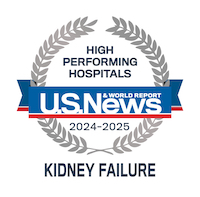Treatments for Kidney Disease, Kidney Cancer and Kidney Stones
Virtual Visits Available
Virtual Health enables you to speak with providers using your phone, tablet or computer. Call 888-4GW-DOCS to schedule a virtual appointment.
 The Nephrology Services staff at George Washington University Hospital can treat stable and acutely ill patients who have uncontrolled hypertension, fluid electrolyte disorders, chronic kidney disease or an acute kidney injury. The multidisciplinary team provides care ranging from traditional therapies to emerging experimental treatments for those participating in clinical trials.
The Nephrology Services staff at George Washington University Hospital can treat stable and acutely ill patients who have uncontrolled hypertension, fluid electrolyte disorders, chronic kidney disease or an acute kidney injury. The multidisciplinary team provides care ranging from traditional therapies to emerging experimental treatments for those participating in clinical trials.
Schedule an Appointment
Please fill out our general appointment form below or call our referral service at 888-4GW-DOCS.
Dialysis
Because of their vital functions such as filtering wastes and fluids from the bloodstream, kidneys are essential for human survival. Dialysis is a treatment that filters the blood for the body when the kidneys fail. There are two types of dialysis:
- Hemodialysis uses a machine, often referred to as an artificial kidney, to do the work.
- Peritoneal dialysis uses the lining of the abdomen to filter the blood.
In addition to working with patients needing peritoneal dialysis, the acute dialysis unit at GW Hospital has eight Fresenius K series machines and two Cobe-Spectra Plasmapheresis machines which offer patients several dialysis options:
- Conventional Hemodialysis for stable patients with acute and chronic kidney failure
- Continuous Renal Replacement Therapy (CVVH) is provided for acute and critically ill patients who cannot tolerate regular hemodialysis
- Slow Extended Daily Dialysis (SLEDD) is offered as a bridge between CVVH and regular hemodialysis as well as to selected patients who are critically ill and unstable
- Therapeutic Plasmapheresis is offered for renal and non-renal disease by well-trained clinicians, nurses and technicians
Nephrectomy
More than 30,000 Americans suffer from kidney cancer each year and many more have suspicious growths on their kidneys requiring surgical removal or biopsy, known as nephrectomy. Kidney cancer, kidney disease or infection can result in kidney failure. If one or both kidneys fail to operate properly, a patient may need to undergo chronic dialysis treatment or the surgical transplantation of a healthy kidney in order to sustain life.
In a partial nephrectomy, only the diseased or infected portion of the kidney is extracted. A radical nephrectomy involves the removal of the entire kidney, a section of the tube leading to the bladder (ureter), the adrenal gland and the fatty tissue surrounding the kidney. A simple nephrectomy requires the removal of the kidney and a section of the attached ureter.
Minimally invasive approaches have revolutionized the way kidney disorders are treated. GW Hospital was one of the first in the Washington, DC area to offer robotic and partial nephrectomy.
Kidney Stones
In the past, patients with kidney stones too large to pass faced a major surgery to remove the stones. Even when stones were smaller, passing kidney stones was painful and not always possible. Extracorporeal shockwave lithotripsy (ESWL) is a major advance in the ability treat kidney stones.
Other Services
- Kidney Biopsy removes cells or tissue to check for cancer or other disease using a single puncture wound through the skin
- Renal Imaging services are provided through the department of radiology
- Interventional Nephrology services are provided in collaboration with the division of interventional radiology, which includes placement of arterial venous shunts, hemodialysis catheters, imaging of vascular access, declotting of clotted access
- Nephrologists work with experienced urologists to deliver care to patients with problems related to urogenital system including medical management of obstructive uropathy, nephrology care and post-nephrectemy care

The Ron and Joy Paul Kidney Center is focused on fighting kidney disease and encouraging transplants. Learn More about Ron and Joy Paul Kidney Center
To request an appointment at the GW Transplant Institute, call 202-715-4225.
